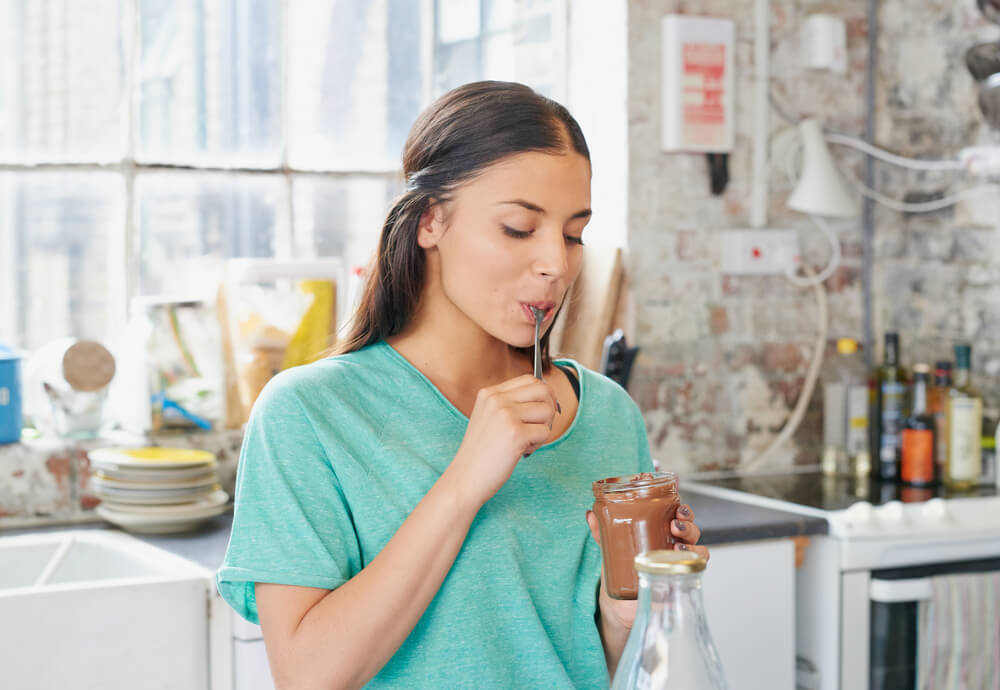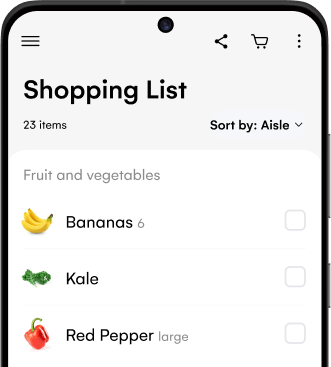Most diets and lifestyle changes are geared towards weight loss, but there are many people that have a hard time gaining weight. While a diet full of ice cream, pizza, and hamburgers may sound like a quick way to gain some weight, it isn’t that simple. A healthy weight gain meal plan is a better and more sustainable choice.
Plan meals together! Share this plan with your family

Eating balanced meals that are nutrient dense are just as important for someone who is trying to gain weight as lose it. Weight isn’t always indicative of good health. For instance, someone who is underweight may also have diabetes, high cholesterol, or another medical condition.
Meal planning and even working with a dietitian is a good way to ensure you’re getting the calories you need without sacrificing macronutrients and micronutrients.

Steps to successful and healthy weight gain
Before you start your journey to gain weight in a healthy way, you need to figure out your macros and calorie needs. You could gain weight by just living on donuts, but it wouldn’t be healthy or pleasant!
Calculating your caloric needs is the first step towards weight gain. If you know how much you need to maintain weight, you can work out what you need to consume to gain weight.
The Mayo Clinic calculator provides estimated caloric needs for weight maintenance. It allows you to factor in your current activity level. With a goal of weight gain, adding 500 calories to that number is a good place to start.
In term of macros, The Acceptable Macronutrient Distribution Range (AMDR) for an adult is 45-65% calories from carbohydrates, 20-35% of fat, and 10-35% of protein. Your individual goals and macro ratio may vary and can be changed. These numbers are not set in stone. Figuring out the right balance of protein, fat, and carbs for your body is key to successfully gaining weight.
Meal plans are a great starting point. They should be used as a guide and keep in mind that any changes or substitution made will change the nutritional composition of the meal. When you import a recipe to Samsung Food, it will automatically calculate nutritional info – and you can substitute ingredients to see the impact as well.
How to increase calorie consumption
Calories come from carbohydrates, protein, and fat. Fat is the macro with the most calories. So, adding sources of fat is the fastest way to increase calories. But that doesn’t mean deep frying everything. There are plenty of fat options that are heart healthy.
If you feel like your meal plan falls short of a few calories, these are a great way to add some:
- Adding olive oil to salads, marinades, and cooking pans (1 Tbsp: ~126 calories)
- Using avocado on toast, in place of mayo, or in salads (½ avocado 113.5 calories)
- Mixing nuts or nut butter into oatmeal, yogurt, or smoothies (2 Tbsp: ~191 calories)
- Adding seeds like chia/ flax/hemp/sunflower to yoghurt, smoothies, oatmeal, and cereal (1oz chia: 138 calories)
- Coconut oil can be used for cooking or baking (1 Tbsp: 125 calories)

7 day meal plan (approximately 2,000 calories per day)
Balanced meals include protein, fat, carbohydrates, and fiber. A lot of fiber comes from fruits, vegetables, and whole grains. If you have any dietary restrictions, you can input it into the app or make manual modifications.
The following 7 day meal plan follows a 2,000 calorie diet and the macronutrient breakdown is based off of the ADMR middle point. Calorie and macronutrients are all estimated calculations, but each meal can be altered to fit specific needs.
Please note that any modifications made to the recipe may change the nutrition composition. All of the recipes can be found on the Samsung Food app and saved to your meal planner for easy reference later.
Day 1
Breakfast (668.31 calories)
Morning snack (162.4 calories)
- Two pieces of Frozen Yoghurt Bark
Lunch (567.11 calories)
- One serving Mediterranean – Style Sautéed Shrimp and Zucchini
- Add one small chicken breast to sauté
- One cup cooked whole wheat penne
Afternoon snack (278.24 calories)
- One serving of peanut butter fruit dip
- 1 medium sliced apple
Dinner ( 610.39 calories)
- One Stuffed Pepper
- 1 cup Simple Green Bean Tomato Salad
Daily Total: 2,286.45 calories, 110.03g fat, 133.38g carbs, 125.39g protein, 1,918.58mg sodium, 23.78g fiber

Day 2
Breakfast (593.78 calories)
- One Breakfast Bowl
- One small multigrain bagel
- One medium banana
Morning snack (185.6 calories)
Lunch (523.12 calories)
- Greek Chicken Orzo Power Bowl
- 2 tbsp Hummus
Afternoon snack (257.32 calories)
Dinner (506.66 calories)
- Korean Beef Lettuce Wraps
- ½ cup white rice
- 1 cup cooked broccoli
Daily Total: 2066.48 calories, 111.5g protein, 69.233g fat, 227.2g carbs, 39.62g fiber, 1961.62mg sodium

Day 3
Breakfast (530.78 calories)
- Simple Breakfast Smoothie
- One slice Avocado Toast
Morning snack ( 221.09 calories)
- 10 Coconut Chocolate Balls
- 1 cup of strawberries
Lunch (512.21 calories)
- Healthy Chicken Fajita Bowl
- ½ California avocado
Afternoon snack (211.32 calories)
- One Super-Seed Snack Bars
- One medium pear
Dinner (687.1 calories)
Daily Total: 2,162.5 calories,86.671g fat, 267.37g carbs, 98.036g protein, 2,179.06mg sodium, 47.795g fiber
Save time on grocery shopping

Day 4
Breakfast (468.83 calories)
Morning snack (193.01 calories)
Lunch (607.74 calories)
- Thai Salad with Peanut Sauce
- ½ Slice of naan
Afternoon snack (200.7 calories)
- Baked pears
- ½ cup whole milk greek plain yogurt
Dinner (533.45 calories)
Daily total: 2003.78 calories, 99.398g fat, 211.44g carbs, 86.141g protein, 1395.67mg sodium, 28.869g fiber

Day 5
Breakfast (225.39 calories)
Morning snack (225.21)
- Half of serving Healthy Trail Mix
Lunch (585.77 calories)
- Easy Healthy Taco Salad
- 2oz baked tortilla chips
Afternoon snack (240.73 calories) :
- 1oz cheddar cheese
- 4 multigrain crackers
Dinner (543.43 calories)
Daily total: 2128.53 calories, 122.565g fat, 180.26g carbs, 84.969g protein, 1773.195mg, 29.14g fiber

Day 6
Breakfast (580.35 calories)
- One Banana Pinwheels
- 1 cup whole milk greek plain yogurt
Morning snack (230.46 calories)
- 3-ingredient chia pudding
- 1 cup of strawberries
Lunch (556.59 calories)
- Satay Chicken Lunch Bowls
- ½ cup white rice
Afternoon snack (187.38 calories)
Dinner (557.56 calories)
- Slow-Cooker Turkey Chili
- ½ California avocado
- 1oz baked tortilla chips
Daily total: 2077.34calories, 98.851g fat, 212.53g carbs, 93.41g protein, 2222.03mg sodium, 43.865

Day 7
Breakfast (568.79 calories)
- Banana Split Breakfast calories may vary
Morning snack (352.75 calories)
Lunch (633.58 calories)
- Lentil Soup
- One slice Avocado Toast
Afternoon snack (235.4 calories)
- 1 ¼ cup Best Stovetop Popcorn
- 1oz cheddar cheese
- ½ cup of grapes
Dinner (542.89 calories)
Daily Total: 2344.97 calories, 98.14g fat, 269.795g carbs, 112.69g protein, 2013,645mg sodium, 46.7g fiber

Tying it all together
While most people tend to focus on high calorie, high fat, processed foods when trying to gain weight, it is important to maintain a balanced diet. If your goals are not being met or if you are trying to increase more muscle mass then the caloric intake or macro ratio needs to be changed. Instead, the focus should be on whole foods which meet your macros and provide you with plenty of vitamins, minerals, and fiber.
In addition, exercising can be beneficial. This is because it may help increase muscle mass, which weighs more than fat. Calorie and macro counting may not be for everybody, especially those in eating disorder recovery or at risk for developing an eating disorder. If you are trying to gain weight but have a history of an eating disorder or disordered eating, it may be beneficial to reach out to an eating disorder specialist and an interdisciplinary team for support and guidance.


